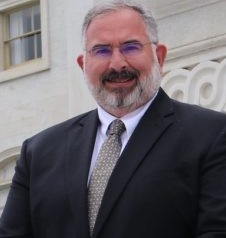By Brent Addleman | The Center Square
New leadership has been appointed to the Vermont’s Department of Financial Regulation.
Gov. Phil Scott announced that Kevin Gaffney has been named as commissioner of the Department of Financial Regulation, and Emily Brown has been appointed as deputy commissioner of insurance within the department.
Gaffney will earn an annual salary of $134,388.80 as commissioner of the department, while Brown will earn $122,699.20 in her role within the department, according to information from the governor’s office.

Kevin Gaffney
“Both Kevin and Emily bring incredible experience to their new roles,” Scott said in a release. “Their knowledge of the state, the department and the industries they serve will make sure DFR’s reputation for extensive expertise and service continues. Kevin brings a strong balance of industry experience and leadership along with a regulatory discipline that will serve Vermonters well. With Emily’s legal, legislative and regulatory experience, she will be hugely beneficial to the administration’s work to address the many challenges facing the health care system, affordability for Vermonters, and beyond.”
The department, according to the release, works to protect consumers in order for businesses in banking, insurance, securities, and captive insurance are able to operate and have access to information and guidance in the state.
According to the release, Gaffney has been serving since May 5 in an interim role and served as deputy commissioner of insurance for the past three years. Previously, he worked in roles of increasing responsibility within the department over the past 10 years.
“I feel honored and humbled by the opportunity to lead such an engaged and committed group of financial regulatory professionals,” Gaffney said in the release. “The responsibility of being the chief financial regulator in the state is not something I take lightly. Protecting the financial well-being of Vermont consumers while maintaining a robust and vibrant financial services marketplace that provides valuable benefits and services to all Vermonters is a key mission at DFR and I intend to expand our focus and outreach in these areas.”
Brown, according to the release, serves as director of insurance regulation in the department with a focus on health care policies and issues pertaining to insurance coverage. In her work, she guided analysis that eventually added hearing benefits to the state’s Qualified Health Plans.
“I am honored to have this opportunity to continue to serve Vermonters with the support of the great team at DFR,” Brown said in the release. “I look forward to continuing our work to keep our markets sustainable and ensure consumers are protected.”



OVERPAID !!! What a waste of money,, but hey that’s what democrats and RINOS do WASTE MONEY…
When I ran for governor I called for the elimination of deputy commissioners and assistant secretaries. That would save several million a year. If a commissioner was unavailable while on vacation or for illness the agency would function just fine for a short time. But these people can’t spend enough money.
According to U.S. Labor Stats, there are 52,700 government employees in Vermont. That’s 1 employee for every 12 people. Add them to the 61,000 health and education workers and you have a significant voting block…. about 40% of the non-farm work force. Then add the non-profit sector. While the specific number of non-profit employees isn’t listed, keep in mind that Vermont has more non-profits per capita than any other state. Then add their families and friends.
Clearly, this segment of the workforce is addicted to the system and the only way to limit these taxpayer funded costs is to let the State go bankrupt and pick-up the pieces – if we even can. After all, like any addict, they will spend all of their own money, and then our money, to support their habit. And when they run out of that, they’ll begin stealing whatever we have left through property taxes and confiscation.
Call it the ‘tyranny of the majority’ or the ‘tyranny of the common’. It’s an inevitable scenario. Two wolves and a lamb voting on what to have for lunch.